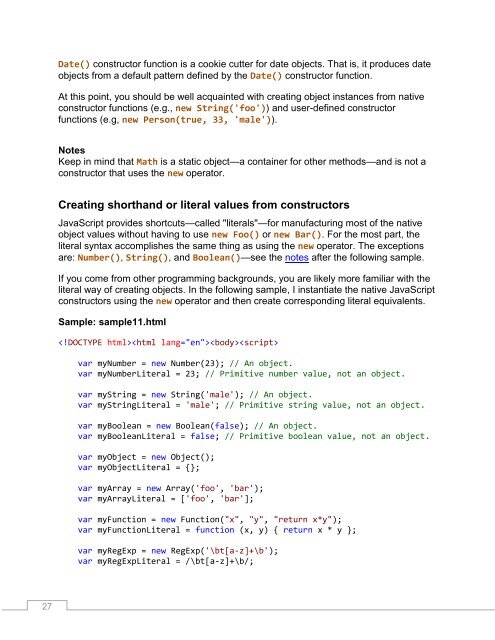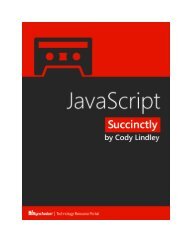JavaScript_Succinctly
Create successful ePaper yourself
Turn your PDF publications into a flip-book with our unique Google optimized e-Paper software.
Date() constructor function is a cookie cutter for date objects. That is, it produces date<br />
objects from a default pattern defined by the Date() constructor function.<br />
At this point, you should be well acquainted with creating object instances from native<br />
constructor functions (e.g., new String('foo')) and user-defined constructor<br />
functions (e.g, new Person(true, 33, 'male')).<br />
Notes<br />
Keep in mind that Math is a static object—a container for other methods—and is not a<br />
constructor that uses the new operator.<br />
Creating shorthand or literal values from constructors<br />
<strong>JavaScript</strong> provides shortcuts—called "literals"—for manufacturing most of the native<br />
object values without having to use new Foo() or new Bar(). For the most part, the<br />
literal syntax accomplishes the same thing as using the new operator. The exceptions<br />
are: Number(), String(), and Boolean()—see the notes after the following sample.<br />
If you come from other programming backgrounds, you are likely more familiar with the<br />
literal way of creating objects. In the following sample, I instantiate the native <strong>JavaScript</strong><br />
constructors using the new operator and then create corresponding literal equivalents.<br />
Sample: sample11.html<br />
<br />
var myNumber = new Number(23); // An object.<br />
var myNumberLiteral = 23; // Primitive number value, not an object.<br />
var myString = new String('male'); // An object.<br />
var myStringLiteral = 'male'; // Primitive string value, not an object.<br />
var myBoolean = new Boolean(false); // An object.<br />
var myBooleanLiteral = false; // Primitive boolean value, not an object.<br />
var myObject = new Object();<br />
var myObjectLiteral = {};<br />
var myArray = new Array('foo', 'bar');<br />
var myArrayLiteral = ['foo', 'bar'];<br />
var myFunction = new Function("x", "y", "return x*y");<br />
var myFunctionLiteral = function (x, y) { return x * y };<br />
var myRegExp = new RegExp('\bt[a-z]+\b');<br />
var myRegExpLiteral = /\bt[a-z]+\b/;<br />
27



